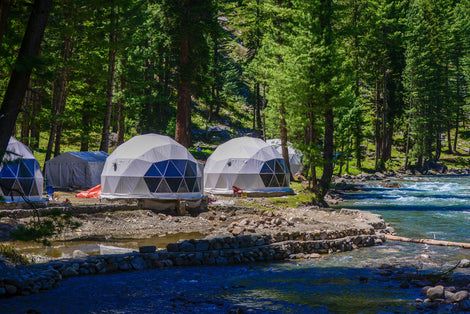Off-Grid Power Problems During Cold Weather
Living off-grid during the cooler months can bring unique challenges, especially when your power source depends on how much sunlight you're getting. Off-grid solar kits are usually reliable most of the year.
But when cold weather arrives, they start showing a different side like slower charging, interrupted energy flow, and weaker performance. These problems aren't just annoying. They can make your day-to-day routine harder, especially if you're depending on solar power for your heat, fridge, or water pump.
Winter power problems don't always come with a warning. One evening everything's running fine, and the next morning your system is barely pulling in energy. That's because cold weather can affect all parts of an off-grid solar setup: panels, batteries, and inverters.
If you've got gear like the EP4 off-grid inverter, keeping an eye on how it holds up in freezing temps becomes even more important. The good news is many of these problems can be handled or even prevented with smart prep and a few steady habits.
Common Cold Weather Challenges
Cold weather does more than freeze your pipes or keep you indoors. It can mess with your off-grid power system from top to bottom. Solar setups need sunlight, but they also rely on temperature, airflow, and proper storage to work right. When any of those get thrown off balance, problems start to show which happens a lot in winter.
Here's how cold weather can affect different parts of your system:
1. Batteries struggle in the cold. Most off-grid systems rely on batteries to store power for nighttime or cloudy days. When temperatures drop, those batteries can slow down and lose capacity. Cold weather can also affect how fast they charge, which makes it harder to build a solid energy reserve before the next sunset.
2. Snow and clouds reduce panel output. Solar panels work best with clear skies and direct sunlight. Even a thin layer of frost or snow can lower their performance. Shorter days and heavier cloud cover during winter make matters worse. So even if your panels look clean, there might not be enough sunlight to power your system at the same pace you're used to.
3. Inverters like the EP4 can act up in freezing temps. Inverters are like your system's brain. They take raw solar energy and turn it into usable power for appliances. Cold weather can cause them to glitch, slow down, or cycle less efficiently. Whether it's a delayed startup or a full system error, a frozen inverter is a headache you don't want.
One common example includes someone living off-grid in a cabin setup with a solar array and battery bank running on an EP4 off-grid inverter. Once snow stacked up and overnight lows dipped below freezing, the system began timing out in the morning. The panels weren't clearing themselves, and by the time enough sun came around, too many parts had already underperformed. This led to low daily output unless everything received a quick checkup right after sunrise.
Being aware of these cold-weather hurdles is a key part of making it through the season without major power interruptions.
Solutions For Battling Winter Power Problems
Even though winter can bring trouble to your off-grid system, most of those issues can be controlled with some simple planning and daily habits. Once you know what might go wrong, it gets easier to stay ahead of problems.
Start with your battery bank. Low temps can kill battery efficiency unless those batteries are insulated and placed somewhere protected. If you're using a shed or garage, think about lining the interior walls or building a ventilated battery box. Some people use small heaters, as long as they're safe and efficient. Battery blankets also work if you don't want or can't use heat.
Keeping solar panels snow-free is another habit that pays off. A soft-bristled roof rake or telescoping snow brush can help knock snow off without scratching anything. Don't wait until a big pile forms. A quick dusting today is easier than fixing frozen spots tomorrow. Ice is harder to remove without damaging surfaces, so it's better to prevent it by staying on top of light frost early.
Next, focus on your inverter setup especially if you're using the EP4 off-grid inverter. Its indoor location matters. Placing it inside a weather-sealed shed or cabinet protects it from outdoor freezing. Airflow should stay clear so the unit doesn't overheat on the inside, which could cause condensation and frost. Letting the unit "warm up" for a few minutes during cold mornings helps it stabilize before heavy usage.
Here's a winter prep checklist to keep you on track:
- Insulate battery storage areas or install temperature control
- Keep solar panels clear of snow and ice with soft tools
- Check your inverter for warning lights or strange noises
- Make sure vents, fans, and exhausts on all components stay clear
- Inspect wires and connectors for cracking or cold damage
- Use low-power devices on cloudy days to manage energy load
Each of these tasks is small but builds toward a reliable system that can stand up to cold snaps.
Ensuring Reliable Power During Winter
Once the first freeze hits, don't relax just yet. Cold air brings different problems throughout the season, and your system might not act the same in January as it did in November. This is why regular checkups mean more than just a one-time prep.
Make a habit of doing a simple walk-through each week. Take notes on anything new or different. Some off-grid users write everything in a notebook stored near the system. It takes as little as five minutes. Over time, this gives you a baseline of how your equipment performs in cold weather.
Backup power options can make a big impact. A portable battery system or backup inverter can buy you time when solar output drops. Hooking that extra reserve into just a few major appliances like water pumps or heat sources can keep your household running smoothly until the sun comes out again.
Also, choose equipment built for long-term cold weather performance. The EP4 off-grid inverter is a good option, but some models work better in low temperatures than others. Battery types matter, too. Some lithium options handle cold better than older chemistries. Buying cold-ready gear can save time, frustration, and unexpected repair costs over time.
Making Winter Preparations
The most helpful move you can make takes place before winter hits. Prepping in early November gives you the best shot at a steady winter. If you wait until the first snow, your system might already be behind.
Inspect your panels, tighten up connections, and clean every component. Check weather seals around your inverters, the insulation in your battery box, and how well external wires and conduits are held up against cold winds. All of this matters for keeping energy moving smoothly.
Run through a few "what-if" moments. If your system fails tonight, do you have a heat backup? Would the inverter reboot? Can you tap into an extra power source for lights or refrigeration? Running through these situations before it gets rough outside gives you options when something actually goes wrong.
Have an emergency bin nearby with spare fuses, insulation wraps, gloves, lights, and anything you might not want to hunt for during a blizzard. Digital tools come in handy. Having a dependable weather app or notification system helps you stay ahead of sudden cold fronts.
Staying Powered Up This Winter
Cold weather forces you to stay more hands-on with your solar setup, but that doesn't mean it has to cause problems. The systems that thrive in winter are the ones that are looked after regularly.
When you keep a close eye on how your batteries, solar panels, and your EP4 off-grid inverter respond to freezing temps, you're in a stronger position to keep your home powered without last-minute stress. Add in a few habits and a winter plan, and you'll spend more time enjoying the comfort of your space instead of troubleshooting outages.
Living off-grid is all about staying ahead and taking care of the tools you depend on. Winter makes that mindset even more important. With the right awareness and effort, your system won't just survive the cold, it will perform through it.
Ready to take your off-grid power experience to the next level this winter? Equip your setup with an off grid solar panel kit with a battery and inverter from Green Vista Living, designed to withstand harsh weather conditions and keep your home powered without interruption. Our premium kits provide reliable performance and peace of mind, ensuring your energy needs are met even during the coldest months. Don't let winter catch you off-guard, prepare now for a seamless off-grid experience.







